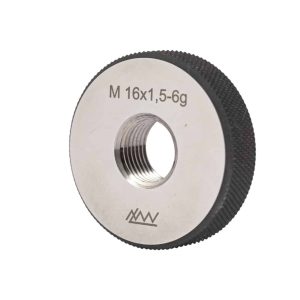
Screw ring gauges are used to verify the external threads of screws, bolts, and other threaded parts. Calibration ensures that these gauges provide accurate measurements, which is crucial for ensuring that threaded components fit together correctly. Regular calibration ensures that the measurements taken by the screw ring gauges remain consistent over time, which is crucial for maintaining product quality and ensuring that components are interchangeable.
Rhopoint Metrology offers ISO 17025 UKAS certified calibration for screw ring gauges. With years of experience in the field and our specialized knowledge ensures a thorough and precise calibration process.
Our services are available onsite and at our laboratories in Birmingham and Bristol. Enquire now for pricing.
Thread Ring GaugesTo Top | ||||
| UKAS Calibration for Ring Gauges – Threaded (Screw Rings) – Parallel – up to 100 mm (up to 4″) | UKAS | Add to Quote | ||
| UKAS Calibration for Ring Gauges – Threaded (Screw Rings) – Parallel – 100 – 150 mm (4 – 6″) | UKAS | Add to Quote | ||
| UKAS Calibration for Ring Gauges – Threaded (Screw Rings) – Parallel – 150 – 250 mm (6 – 10″) | UKAS | Add to Quote | ||
| UKAS Calibration for Ring Gauges – Threaded (Screw Rings) – Parallel – above 250 mm (above 10″) | UKAS | Add to Quote | ||
| UKAS Calibration for Ring Gauges – Threaded (Screw Rings) – Taper – up to 100 mm (up to 4″) | UKAS | Add to Quote | ||
| UKAS Calibration for Ring Gauges – Threaded (Screw Rings) – Taper – above 100 mm (above 4″) | UKAS | Add to Quote | ||
| UKAS Calibration for Ring Gauges – Threaded (Screw Rings) – Trapezoidal – up to 50 mm (up to 2″) | UKAS | Add to Quote | ||
| UKAS Calibration for Ring Gauges – Threaded (Screw Rings) – Acme – up to 50 mm (up to 2″) | UKAS | Add to Quote | ||
| UKAS Calibration for Ring Gauges – Threaded (Screw Rings) – Acme – above 50 mm (above 2″) | UKAS | Add to Quote | ||
| UKAS Calibration for Ring Gauges – Threaded (Screw Rings) – Buttress – up to 50 mm (up to 2″) | UKAS | Add to Quote | ||
| UKAS Calibration for Ring Gauges – Threaded (Screw Rings) – Buttress – above 50 mm (above 2″) | UKAS | Add to Quote | ||
| Traceable Calibration for Ring Gauges – Threaded (Screw Rings) – Line Pipe | Traceable | Add to Quote | ||
If you haven’t found the calibration you require or need some further assistance with your requirement, contact us using this form and we can find the solution you are looking for.
To ensure we can promptly address your calibration enquiry, please complete the form with all the necessary details. This will help us to provide you with accurate and timely assistance.
For urgent enquiries, please contact us directly via phone at:
Theses standards specify the tolerances and limits for simple forms of thread gauges, such as:
Parallel thread plug gauges
Parallel thread ring gauges
It is highly recommended that an appropriate authority such as a UKAS approved laboratory carries out a full calibration on thread gauges at least once a year. In between UKAS calibrations at a frequency based on usage, thread gauges should be calibrated in-house. A typical in-house calibration would include a written procedure and an associated calibration record sheet, which would contain as a minimum, the following listed information:
(a) Serial number
(b) Location
(c) Procedure number
(d) Rate and compression correction
(e) Gauge tolerance
(f) Results
(g) Measurement uncertainty
(h) Sentence if appropriate
(i) Date and calibrators signature
(j) Traceability to National Standards
It is necessary that any person carrying out such calibration work should have received appropriate training and have shown the ability to be confident via a suitable training authority. Training records should be held and maintained.
Following are layouts for typical in-house calibrations for thread gauges:
Calibration to be carried out in accordance with in-house procedure number …………………..
Serial Number: Make:
Calibration Date: Sizes:
FEATURE EXAMINED SPEC. MEASURED RESULTS
GO:
Major diameter
Pitch diameter
Minor diameter
NOT GO:
Major diameter
Pitch diameter
Minor diameter
(Go and NOT go are measured at the front, middle and back of the thread)
The thread gauges were visually inspected for damage and the following faults were noted:
MEASUREMENT UNCERTAINTY +/- 0.003mm (1-100mm range)
Source: UKAS schedule of accreditation, Calibration and measurement capability (CMC)
Calibrators Signature: ………………………………….
A traceability statement in this section would be required for all items and their relevant certification utilised for the calibration of thread gauges.
All of our Laboratories are accredited to provide UKAS & Traceable calibrations to all the relevant standards giving you peace of mind.
Make consistent, accurate and reliable measurements
Ensure longevity of the measuring instruments
Ensure safety in critical applications such as medical and aerospace
Rhopoint Metrology Ltd Eurolab House, Unit 10 Valepits Road, Garretts Green Industrial Estate, Birmingham, B33 0TD
Rhopoint Metrology Ltd Brunel House, 28 Old Mills Industrial Estate, Paulton, BS39 7SU